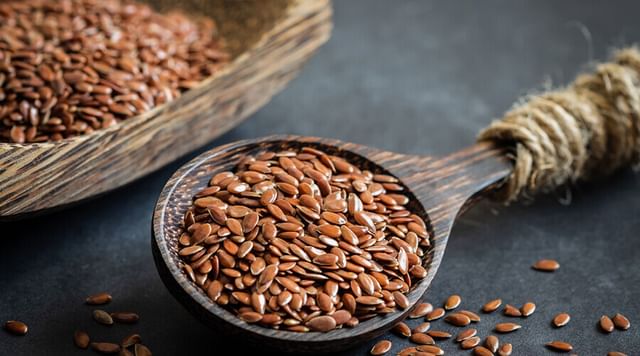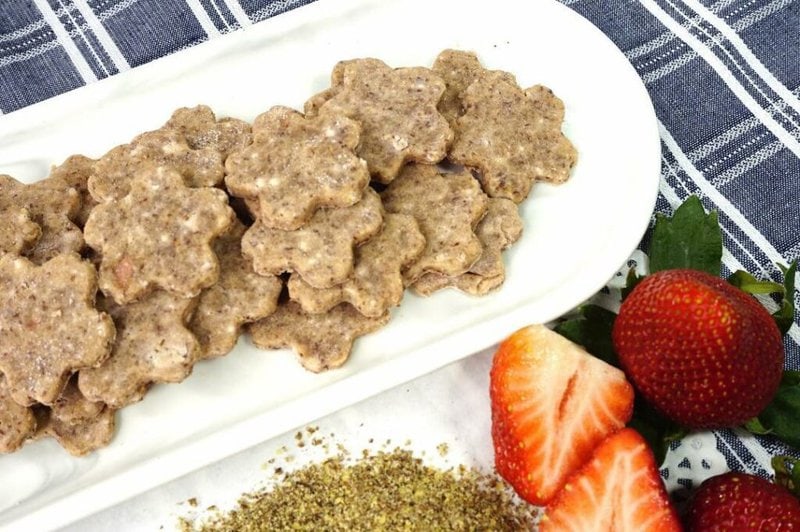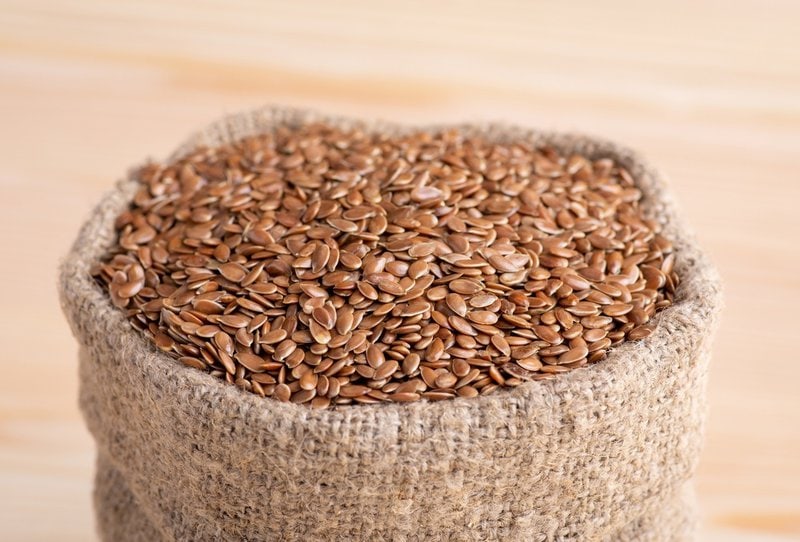Are you a pet owner wondering if it’s safe to give your furry friend flaxseeds? Can dogs eat flaxseeds? It’s a question that many pet owners have since flaxseed is increasingly being used in health products.
Dogs can eat flaxseeds that serve as a potential dietary fiber containing omega-3 fatty acids and vitamin E to help promote a healthy digestive system. However, it is essential to feed flaxseed to your pup in moderation. When overconsumption happens, some dogs typically experience an upset stomach, so monitor their behavior and adjust the amount they consume accordingly.
This blog post explores the potential benefits of feeding flaxseeds to your pet. You will learn how to feed them safely, as well as how much you should give to your dog!
Is Flaxseed A Prebiotic For Dogs?

Yes, flaxseed is indeed prebiotic for dogs. It contains high levels of dietary fiber, which can help support healthy digestion and the growth of beneficial bacteria in the gut.
Additionally, flaxseed is packed with omega-3 fatty acids that have been found to reduce inflammation in dogs and aid in joint health, coat condition, and skin health. It is also a source of lignans, which have antioxidant properties that can help support overall immune system function.
Flaxseed can help increase the number of beneficial bacteria, such as bifidobacteria and lactobacilli. Additionally, flaxseed is rich in alpha-linolenic acid (ALA), an essential fatty acid for healthy cell membranes. This fatty acid helps support a healthy immune system and reduces inflammation.
Flaxseed is a very versatile prebiotic and can be added to your dog’s food as a meal topper or given as a treat. It can also help add fiber to their diet, which is especially beneficial for senior dogs who may have difficulty digesting certain foods.
What Kind Of Flaxseed Is Best For Dogs?
The best flaxseed for dogs is a cold-pressed, organic, and ground flaxseed meal. As with any supplement, introducing flaxseed into your dog’s diet should be done gradually to avoid any gastrointestinal upset.
Cold-pressed flaxseed produces a higher quality oil than heat-pressed versions, and the oil’s freshness helps preserve the beneficial omega-3s. Organic flaxseed is a better option for dogs than the non-organic varieties, as it will not contain any potentially harmful pesticides or herbicides.
Ground flaxseed meal is more easily digested and absorbed by pets than whole seeds, so it’s important to purchase flaxseed in this form if you plan on feeding it to your pup.
Can Dogs Digest Whole Flaxseed?
No, whole flaxseed can accumulate in a dog’s digestive system and cause gastrointestinal distress. Flaxseed is recommended to be ground to a fine powder before feeding it to your pet. Ground flaxseed can benefit your dog’s skin and coat health, help reduce inflammation, and relieve certain allergies.
Can Dogs Have Flaxseed Everyday?

Yes, it is safe for dogs to have flaxseed every day. A small pinch of ground or milled flaxseed can benefit your pup’s coat and skin health. It can also help improve digestion and reduce inflammation due to its high omega-3 fatty acids and dietary fiber content.
However, it is important to note that too many flaxseeds can cause gastrointestinal distress. It is recommended to consult with your veterinarian before adding any supplements or changes to your dog’s diet.
As a general guideline, you should feed no more than one teaspoon of ground flaxseed per the dog’s body weight daily. This should be divided into two or three smaller portions and spread throughout the day.
Can Flaxseed Cause Diarrhea In Dogs?
Yes, flaxseed can cause diarrhea in dogs. This is because flaxseed contains high amounts of fat and fiber, which both have a laxative effect on dogs’ digestive systems. If your dog has eaten too much flaxseed, it will likely experience stomach upset, including loose stools or diarrhea.
It’s important to feed your dog flaxseed in moderation and, if diarrhea occurs, stop feeding it until the symptoms disappear. If your dog continues to experience diarrhea after discontinuing flaxseed, it may be a sign of something more serious, and you should consult your veterinarian.
How Much Flaxseed Should I Give My Dog?
The recommended amount for an average-sized dog is about one teaspoon per day. You can feed this amount at once or spread it throughout the day. If you have a larger dog, then increase the dosage proportionally to its size. The dosage for large dog breeds is typically one to two tablespoons.
However, always start with an introductory period of three days and then gradually increase the amount. It’s also important to use ground flaxseed to ensure your dog can absorb all the nutrients.
Adding flaxseed oil to your dog’s diet can be beneficial, but if you do this, adding only a minimal amount is recommended, as large amounts can cause digestive issues.
How Do I Add Flaxseed To My Dog’s Food?
You can add flaxseed to your dog’s food by adding a teaspoon of ground flaxseed to ¼ cup of their regular kibble.
Mix the flaxseed in well and then offer it to your dog. You can add the same amount of ground flaxseed to canned food, yogurt, or other moist foods. Make sure to mix the flaxseed thoroughly, so it doesn’t clump up.
Here are some other methods of adding flaxseed to your dog’s food!
Use A Topping
Add flaxseed oil or crushed flaxseeds to yogurt, cottage cheese, mashed potatoes, or other toppings for an extra boost of nutrition. This method works great for picky eaters, and you can adjust the amount of flaxseed to suit your dog’s needs.
Mix It With Other Ingredients
Combine ground flaxseed with cooked grains like oatmeal or quinoa. You can also combine it with wet food for a nutrient-rich meal. Flaxseed goes well with fruits and vegetables, so you can use it to make a nutritious dog-friendly salad.
Make Your Own Treats

Try adding ground flaxseed to homemade dog treats or biscuits. This is a great way to ensure that your pup gets all the health benefits of flaxseed. You can also experiment with flavors like fish or chicken to make the treats more appealing.
Infuse It Into the Water
If your dog doesn’t like the flavor of flaxseed, you can try infusing it in their drinking water. This is a great way to sneak some extra nutrition into their diet without them knowing. Make sure you change the water regularly so that it doesn’t lead to bacteria growth.
Bake Treats
Add ground flaxseeds into homemade dog treats for extra nourishment. It’s a delicious way to incorporate some extra nutrition into their diet.
No matter which method you choose, consult with your veterinarian before making any dietary changes, and always use ground flaxseed instead of whole seeds, as they are more easily digested.
Can You Sprinkle Ground Flaxseed On Food?
Yes, you can sprinkle ground flaxseed on food. It is an excellent source of fatty acids and dietary fiber, making it a great addition to smoothies, cereals, salads, yogurts, and other dishes. Sprinkling ground flaxseed onto your food is an easy way to increase the nutritional value of your meals.
However, it is important to remember that ground flaxseed can quickly go rancid. Therefore, buying the whole seed and grinding it in small batches as needed is best.
What Are The Benefits Of Flaxseed For Dogs?
Flaxseed is an incredibly beneficial supplement for dogs in many ways. Not only can it help improve both skin and coat health, but it can also help reduce inflammation and improve digestive health.
Here are some additional benefits of adding flaxseed to your dog’s diet.
Weight Control
The high content of healthy fats and proteins in flaxseed can help reduce hunger, making it easier for a dog to maintain a healthy weight. This can also help reduce the risk of obesity-related health issues. Its high levels of lignans and omega-3 fatty acids benefit weight loss because they support insulin sensitivity and reduce inflammation.
Improved Skin and Coat Health
The fatty acids in flaxseed have anti-inflammatory properties that can help soothe irritated skin and reduce itching associated with allergies or other skin problems. The fatty acids also nourish the dog’s coat and skin, improving its overall condition.
Lower Cholesterol
Flaxseed is high in healthy fats, and fiber helps reduce cholesterol absorption in the intestines. Adding flaxseed to your dog’s diet can reduce their overall cholesterol levels and improve their heart health. This can reduce the risk of heart disease and other cardiovascular problems.
Improved Immune System
The fatty acids in flaxseed are beneficial for strengthening a dog’s immune system, which in turn, helps reduce the risk of disease and illness. Antioxidants found in flaxseed can help protect cells from damage caused by free radicals, improving overall health.
Additionally, flaxseed is a source of dietary fiber, which has been shown to benefit digestive health and provide additional immune benefits.
Better Digestive Health

Flaxseed is a great source of fiber, which can help improve digestion by adding bulk to your dog’s stool. This helps to support a healthy digestive system and reduce constipation.
To get the most out of flaxseed for your four-legged friend, it is best to feed them the right amount and buy ground flaxseed, which helps the body absorb it more efficiently. With these tips in mind, you can keep your dog healthy and happy with the power of flaxseed!
Is Flaxseed Good For Dogs Joints?
Yes, flaxseed is very beneficial for dogs’ joints. Flaxseeds have been proven to reduce inflammation and joint pain. It is an excellent source of dietary fiber, vitamins, minerals, and antioxidants that can help improve overall health.
They also support healthy cartilage strength and cushioning against pressure, encouraging smoother movement in your pup’s joints. Flaxseed is also packed with antioxidants, which can help fight off harmful bacteria and viruses that could otherwise lead to arthritis and other joint problems.
Is Chia Or Flax Better For Dogs?
Flaxseed is better for dogs than chia seeds. Chia seeds are a good source of omega-3 fatty acids and protein, while flaxseeds offer fiber, antioxidants, and lignans. Both are also easy to digest and won’t upset your puppy’s stomach if you add them to their kibble in small amounts.
Regarding omega-3s, chia seeds are a better option as they provide more of these fatty acids than flaxseeds. The same applies to protein content, where chia still comes out ahead. However, flax offers more bang for the buck in terms of fiber and antioxidants.
Flax is also rich in lignans, which are plant compounds that act as antioxidants and anti-inflammatory agents. Chia is more nutrient-dense overall, but flax has certain qualities that make it a better choice for some dogs. If your pup needs more fiber or antioxidants, add a teaspoon of ground flax to their kibble.
Regardless of your choice, always speak to your vet before adding any new food to your pup’s diet. They can help you decide which type of seed is best for your pup and how much they should eat. By doing this, you can ensure that your pup gets the most out of these superfoods!
Can Dogs Eat Chia And Flax Seeds?

Yes, dogs can eat chia and flax seeds but do exercise caution here while feeding.
Chia seeds and flax seeds are healthy sources of omega-3 fatty acids for humans, but pet parents should be aware that too much of these foods can cause digestive upset in pets.
Chia seeds contain a high amount of insoluble fiber, which can cause bloating and diarrhea if consumed in large quantities. Flax seeds contain large amounts of fat and fiber, so they should only be served in moderation.
Feeding your pup either chia seeds or flax seeds should be done in moderation, and always consult with your veterinarian before introducing these foods into your pet’s diet. For safety reasons, it is advisable to grind them up for easier digestion. It will also reduce the risk of choking on larger pieces that may not be able to pass through the gastrointestinal tract.
You can add small amounts of ground chia and flax seeds to your pet’s food but be sure to keep a close eye on their stool. If you notice any changes in consistency or increased gas production, discontinue the seeds immediately.





